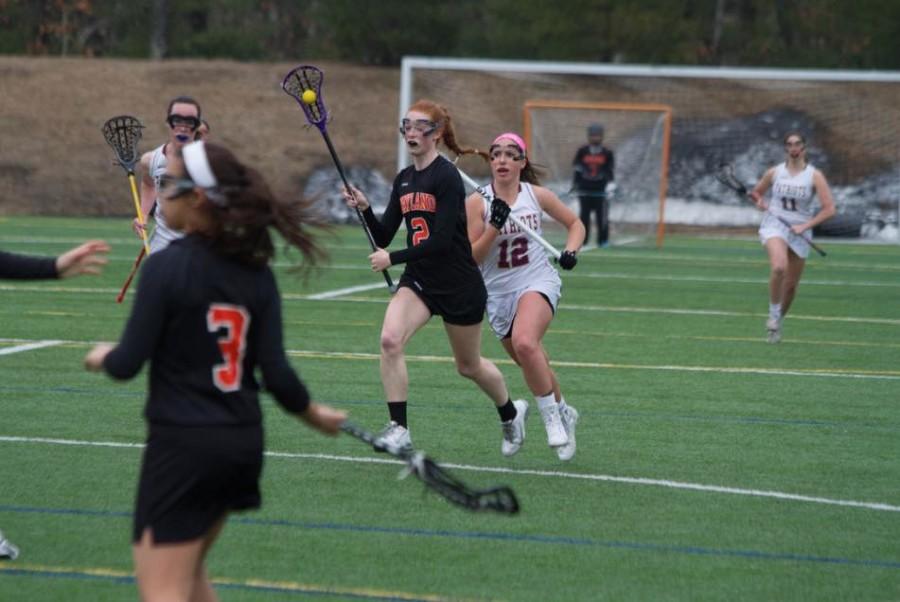Emily Barnard: I’m a very, very competitive person. It’s just who I am
Credit: Courtesy of Emily Barnard
Pictured above is senior Emily Barnard. Barnard was recently recruited to Middlebury College for lacrosse. “As soon as you start playing. the nerves go away, and you’re just playing the game,” Barnard said.
Twirling the lacrosse stick in her hands, she cradles the ball while running toward the net. A single drop of sweat runs down the side of her face. She maneuvers around an opposing player, kicking up a clump of dirt with her cleats in the process. As she nears the goal, she raises the shaft and swings her arms, hurling the ball straight into the net.
Senior Emily Barnard started playing lacrosse when she was in third grade. During her middle school years, Barnard entered the club lacrosse scene. She first joined Mass Elite in 7th grade and then switched to Revolution Lacrosse the following year.
“I started playing when I was in third grade. My mom played in college, so she wanted to get us started kind of young,” Barnard said.
Playing for a club, Barnard is required to go to many tournaments throughout the year. The majority of these matches take place almost every weekend of the summer; however, there are a few games in the fall. Barnard travels to different states for some of these tournaments, including New Hampshire, Virginia, Maryland and Florida.
Not only does Barnard play lacrosse, but she also plays club field hockey. This, along with the many tournaments throughout the year, creates a busy schedule for her. In November, Barnard travels to Florida for her biggest tournament, “The President’s Cup.” Coupled with her club field hockey schedule, Barnard is rarely home to celebrate Thanksgiving.
Barnard must balance her time between school work and her athletic activities. Throughout her sophomore and junior years, she would do much of her homework in the car. According to Barnard, it’s more difficult to do work on the road than at home and is usually less productive. On Sundays, Barnard would drive to a two hour lacrosse practice and drive home to eat dinner only to drive back out again for a field hockey practice.
“You don’t feel like you have a lot of time to do stuff, but for the most part, it was pretty manageable if you handle your time well,” Barnard said. “I think being an athlete helps you manage your time because you’re forced to do things within certain slots of time.”
When preparing for games, Barnard is very serious during practices. She explains that she plays the best when she’s focused. Barnard is also a bit superstitious; she wears the same mouthguard to all of her tournaments for a season.
“I’m a very, very competitive person. It’s just who I am,” Barnard said. “I need to win, so I’m usually very serious when I warm up.”
According to Barnard, a healthy amount of stress before a game is good because it shows that you care and prepares you mentally. Then as the game starts, the worry dissipates.
“As soon as you start playing, the nerves go away, and you’re just playing the game,” Barnard said.
Her favorite aspect of lacrosse is the teamwork. In the past, Barnard has participated in track and swimming, and although they were called teams, “at the end of the day it was just you.” For lacrosse, however, Barnard loves how she can count on every single person on her team.
This year, Barnard’s hard work has paid off. She has recently been recruited by Middlebury College in Vermont for Division III girls’ lacrosse. As with WHS, she plans to be an attacker for the team.
“The recruiting process is very stressful. I commend all athletes who’ve gone through it,” Barnard said.
Barnard started the recruitment process as a freshman. Before every tournament, she would email coaches of the schools that interested her, including details of the location and times of her games. Coaches of the school would then go to the tournaments, watch her play and assess her skills.
“You [need to contact them] for every single tournament, which takes a long time. At the beginning, you’re emailing like 40 schools, and it’s very taxing,” Barnard said.
During her freshman and sophomore year, these coaches could only talk to her club coaches due to MIAA rules. Coaches would also watch Barnard play around seven to eight times at clinics and camps that lasted multiple days of the summer.
According to Barnard, many athletes recruited to Division I schools are guaranteed admission and verbally commit sophomore year. For Division III schools, the student cannot be guaranteed admission and must do an “academic read” after July 1 after the student’s junior year.
“You submit your test scores, your grades and your school profile,” Barnard said. “Admissions officers see if you would get into the school. If your read comes back positively, then they offer you support for your application.”
Barnard was given academic support by Middlebury College. She has applied ED and plans to attend as a student and lacrosse player for the fall of 2016.
Your donation will support the student journalists of Wayland High School. Your contribution will allow us to purchase equipment, cover our annual website hosting costs and sponsor admission and traveling costs for the annual JEA journalism convention.





![Last Wednesday, the Wayland School Committee gathered to discuss a number of topics regarding the health curriculum and Innovation Career Pathway course. Another large topic of conversation was the ways to potentially mitigate distracting cell phone usage. "These [phones] are going to distract your learning and social relationships," Superintendent David Fleishman said. "That's concrete right there."](https://waylandstudentpress.com/wp-content/uploads/2025/06/Screenshot-2025-06-04-at-9.49.31 PM-1200x886.png)



























![Troy Hoyt finishes the Boston Marathon, running for the Hoyt Foundation. T. Hoyt is the son of Hoyt Foundation CEO Russ Hoyt.
“[Running a marathon] might seem like a big thing, when it’s presented to you at first, but if you break it up and just keep telling yourself, “Yes, you can,” you can start chipping away at it. And before you know it, you’ll be running the whole 26 miles, and you won’t even think twice about it.” T. Hoyt said.](https://waylandstudentpress.com/wp-content/uploads/2025/04/C36E8761-1CBB-452E-9DF2-543EF7B1095E_1_105_c.jpeg)














































